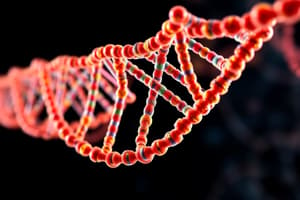Podcast
Questions and Answers
What is the primary purpose of shotgun sequencing?
What is the primary purpose of shotgun sequencing?
- To analyze a single DNA fragment
- To retrieve specific genes from an organism
- To clone chromosomes into vectors
- To break the genome into many small DNA fragments for individual sequencing (correct)
Dideoxy sequencing is conducted in the 5' to 3' direction.
Dideoxy sequencing is conducted in the 5' to 3' direction.
False (B)
What is chromosome walking?
What is chromosome walking?
A technique where a researcher begins at a specific site on a chromosome and analyzes DNA until the gene of interest is reached.
Genome sequencing projects began in the _____ when researchers realized the need for efficient sequencing methods.
Genome sequencing projects began in the _____ when researchers realized the need for efficient sequencing methods.
Match the sequencing methods with their characteristics:
Match the sequencing methods with their characteristics:
What is the purpose of de novo genome assembly?
What is the purpose of de novo genome assembly?
Short-read sequencing generates longer sequences compared to long-read sequencing.
Short-read sequencing generates longer sequences compared to long-read sequencing.
What role does computer software play in de novo genome assembly?
What role does computer software play in de novo genome assembly?
The process of sequencing DNA fragments and organizing them based on overlaps is known as __________.
The process of sequencing DNA fragments and organizing them based on overlaps is known as __________.
Match the following concepts with their descriptions:
Match the following concepts with their descriptions:
Flashcards
De Novo Genome Assembly
De Novo Genome Assembly
The process of determining the complete DNA sequence of an organism's genome without a reference genome.
DNA Fragments
DNA Fragments
Short segments of DNA generated during genome sequencing that can be used to reconstruct the complete genome sequence.
Overlapping Regions
Overlapping Regions
Regions of DNA that overlap between different DNA fragments, providing clues to the order in which they occur on the chromosome.
DNA Bands on Gel
DNA Bands on Gel
Signup and view all the flashcards
Computer Software in Genome Assembly
Computer Software in Genome Assembly
Signup and view all the flashcards
Shotgun Sequencing
Shotgun Sequencing
Signup and view all the flashcards
Chromosome Walking
Chromosome Walking
Signup and view all the flashcards
Genome Sequencing
Genome Sequencing
Signup and view all the flashcards
Sequencing a Specific DNA Fragment
Sequencing a Specific DNA Fragment
Signup and view all the flashcards
Dideoxy Sequencing
Dideoxy Sequencing
Signup and view all the flashcards
Study Notes
Genome Sequencing
- DNA sequencing methods can be broadly categorized as short-read or long-read
- Short-read sequencing (SRS) produces sequences up to a few hundred bases long
- Long-read sequencing (LRS) typically produces sequences from 10,000 to 30,000 bases
- SRS is usually less expensive than LRS
- LRS accuracy is improving
- LRS is better for assembling regions with repetitive sequences
- Sequencing technologies have become less expensive and faster
Genome Mapping
- Physical mapping aims to achieve a complete DNA sequence of a chromosome or genome
- DNA sequences are annotated to show locations of genes, markers, and more
- Early genome sequencing involved inserting fragments into vectors for Sanger dideoxy sequencing
- Modern methods do not use vectors
Genome Sequencing Strategies
- Shotgun sequencing is the most efficient way to sequence a genome
- Shotgun sequencing involves breaking the genome into fragments, sequencing them individually, then determining the order
- The DNA fragments overlap to determine the order they occur on the chromosome
- Software assists in de novo genome assembly
- Issues in de novo genome assembly can include repetitive sequences
Innovations and Advancements in Sequencing
- Technological advancements have made sequencing less expensive and more rapid
- Sequencing costs have significantly decreased
- High-throughput sequencing methods (Next-Generation Sequencing) allow for parallel processing and massive parallel processing
- Examples include Illumina and Oxford Nanopore sequencing
- Illumina sequencing is a sequence-by-synthesis method
Human Genome Project
- Largest genome sequencing project
- Goals include making a physical and linkage map of the human genome, sequencing it, developing technology for managing human genome information, analyzing model genomes, addressing ethical concerns, and developing genetic methodologies
- The Human Genome Project had a significant impact, including insights into human genetic variation associated with diseases
Metagenomics
- Metagenomics is the study of a complex mixture of genetic material obtained from an environmental sample
- The term metagenome refers to a collection of genes from a particular environmental sample
- Metagenomics involves isolating DNA, sequencing it, and determining the genes it contains
- Metagenomics can be used in human medicine to study various microbiome populations in the body, and how they relate to disease
Studying That Suits You
Use AI to generate personalized quizzes and flashcards to suit your learning preferences.




